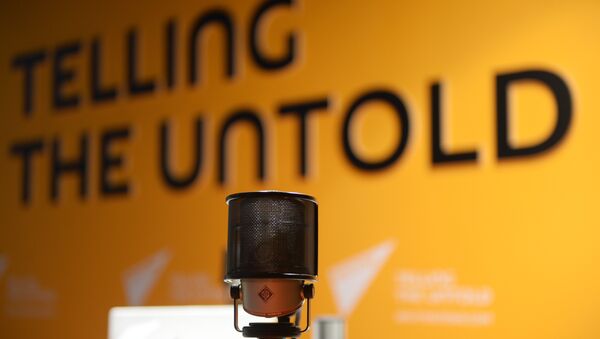MOSCOW (Sputnik) — On Monday, Richard Ferrand told French media that the two outlets "spread fake news", which are later "used, quoted and influence our democratic life." He also cited an example of a news article from a blog, entirely unrelated to RT or Sputnik, which published what he called incorrect information on Macron staying at the French embassy in Lebanon at the expense of the taxpayers.
"The accusations of spreading fake news made by Richard Ferrand are nothing but an attempt at spinning public opinion. These accusations are false and lack any evidence. Our legal team will analyse this issue," Sputnik said in a statement, stressing that it always covers facts and real opinions expressed by people involved in election campaigns regardless of whether anyone finds these unacceptable.
"These are facts and leaving them without attention would constitute a violation of the fundamental principle of freedom of speech," the statement said.
RT stated that Ferrand's "appalling" claims indicated an emerging trend of dismissing genuine news stories as fake on the basis of political preference. The broadcaster also expressed concern over the impact of such claims on the standards of journalism.
"RT adamantly rejects any and all claims that it has any part in spreading fake news in general and in relation to Mr. Macron and the upcoming French election in particular… Indeed, it seems that it has become acceptable to level such serious charges at RT without presenting any evidence to substantiate them, as well as to apply this ‘fake news’ label to any reporting that one might simply find unfavorable," RT said.
The Kremlin has also reacted to claims made by Macron's ally, with Kremlin spokesman Dmitry Peskov calling these accusations "absurd" and drawing a parallel with the 2016 US Russian hacking scandal whereby similar accusations were made. The spokesman added that Sputnik and RT have not run any negative stories about Macron and Ferrand's word appeared to be a mantra.
Russian-based media outlets broadcasting in Europe and the United States have recently faced a barrage of accusations on allegedly spreading fake news and attempting to influence public life. In the United States, intelligence agencies accused Russia of using its media outlets, including RT and Sputnik, to swing the outcome of November's US presidential election in favor of Donald Trump.
In November 2016, the European Parliament voted in favor of a resolution, which said that Sputnik and RT posed danger to Europe’s unity and called for extra European Commission funding for counter-propaganda projects. It also drew a parallel between Russian media and the propaganda disseminated by the Islamic State (IS), a jihadist group outlawed in Russia and numerous other states.
Russian President Vladimir Putin, commenting on the adoption of the resolution, congratulated RT and Sputnik journalists on effective work and stressed that it indicated apparent degradation of the concept of democracy in the Western society.



